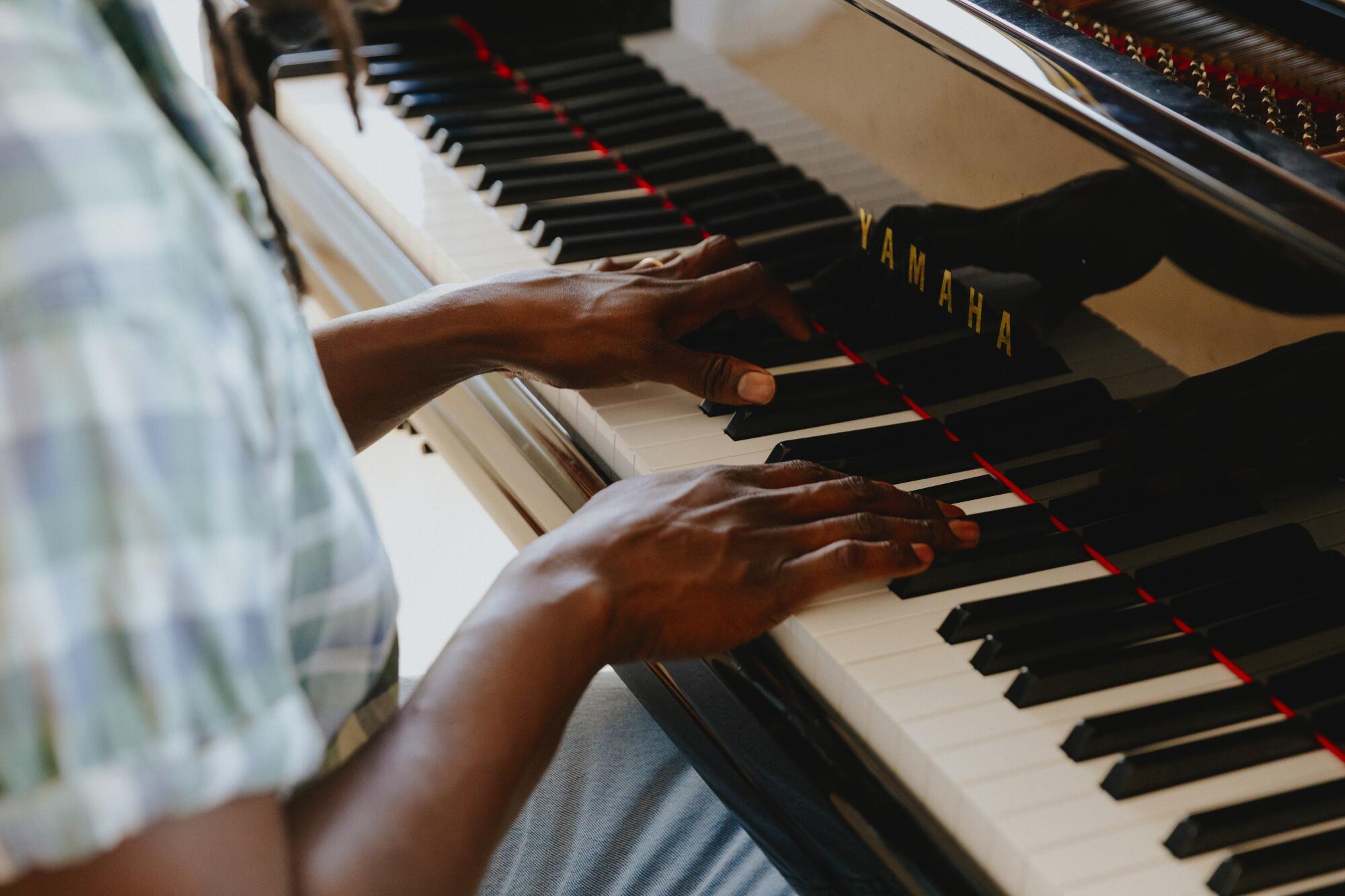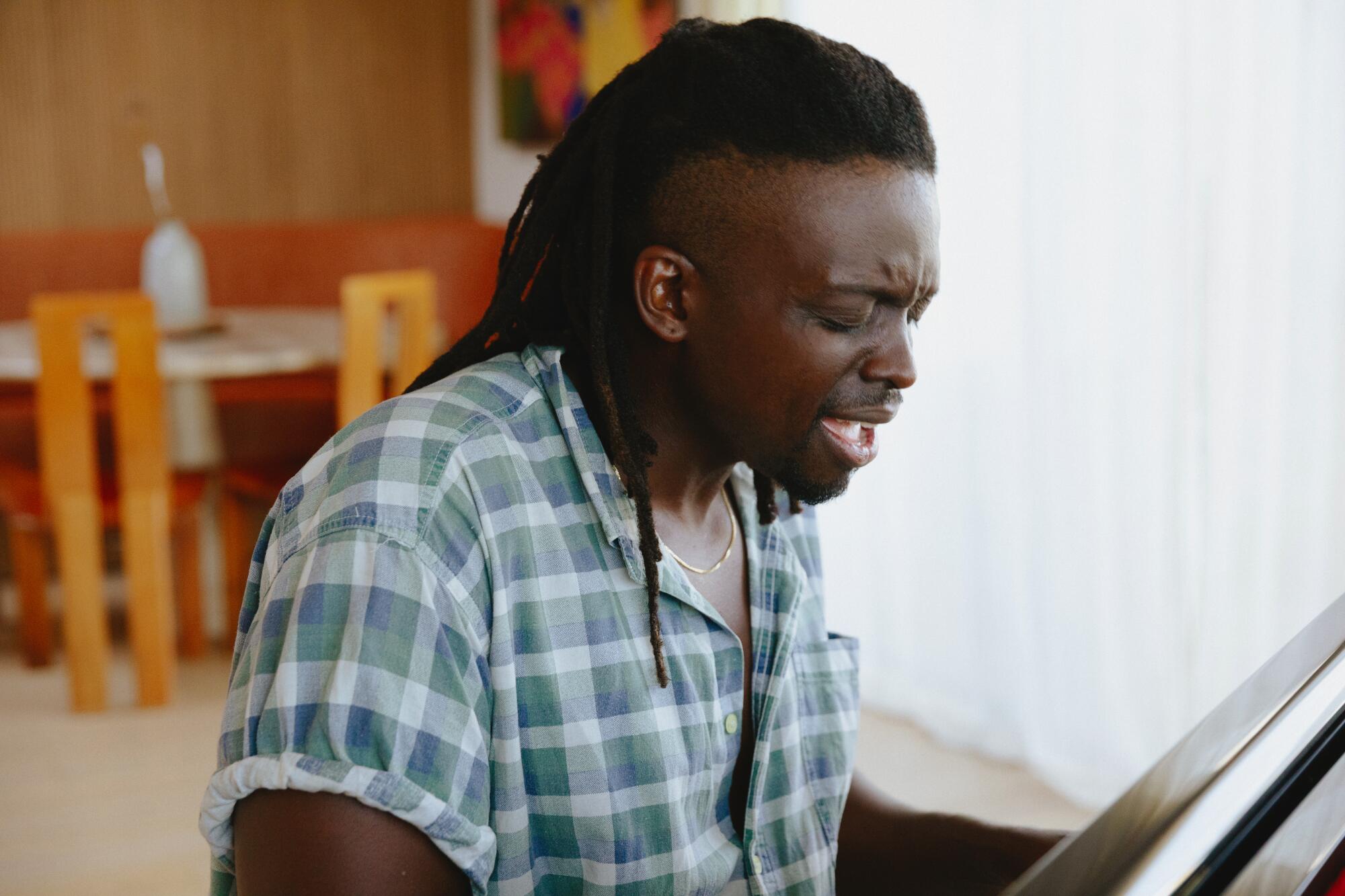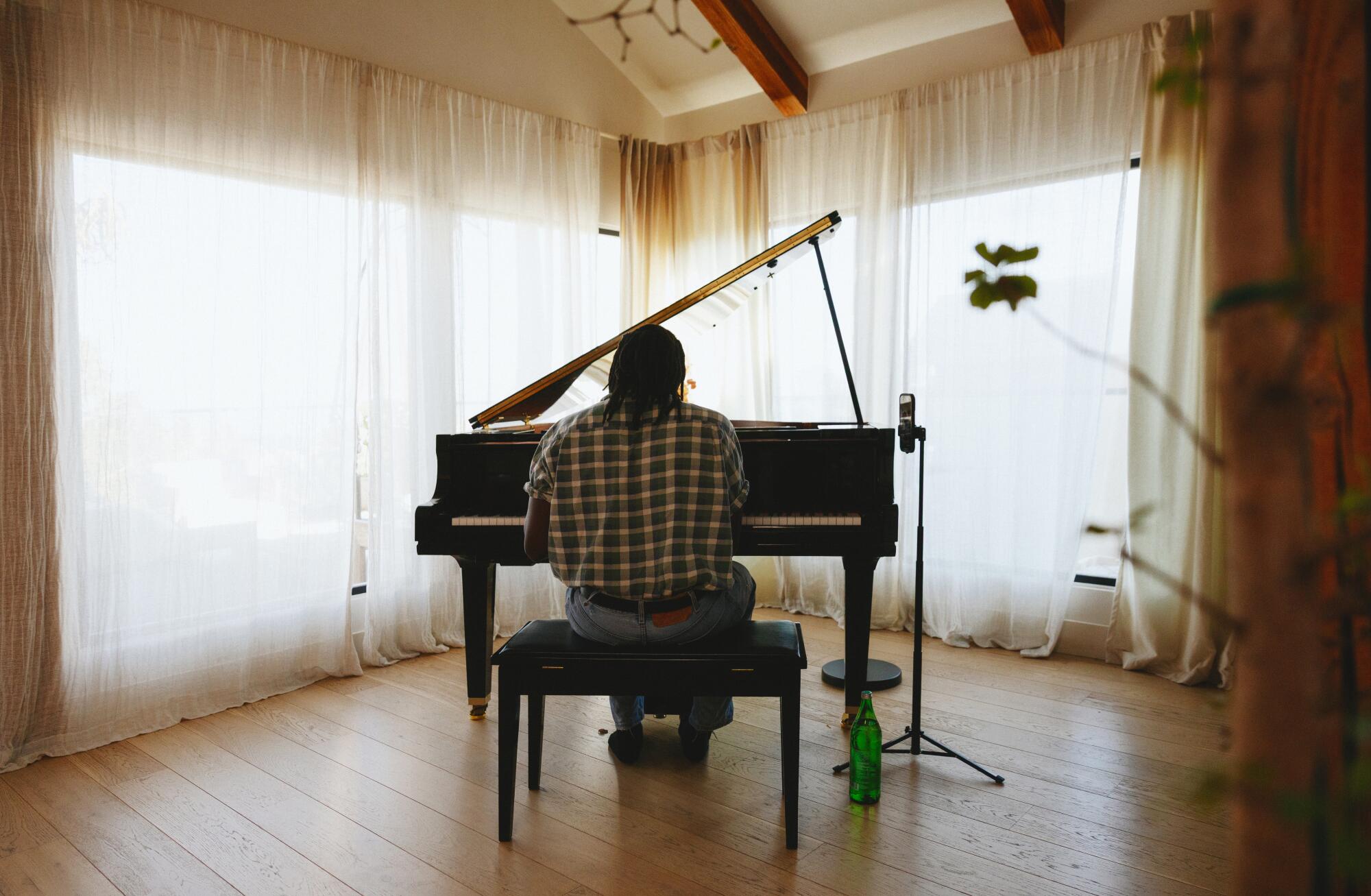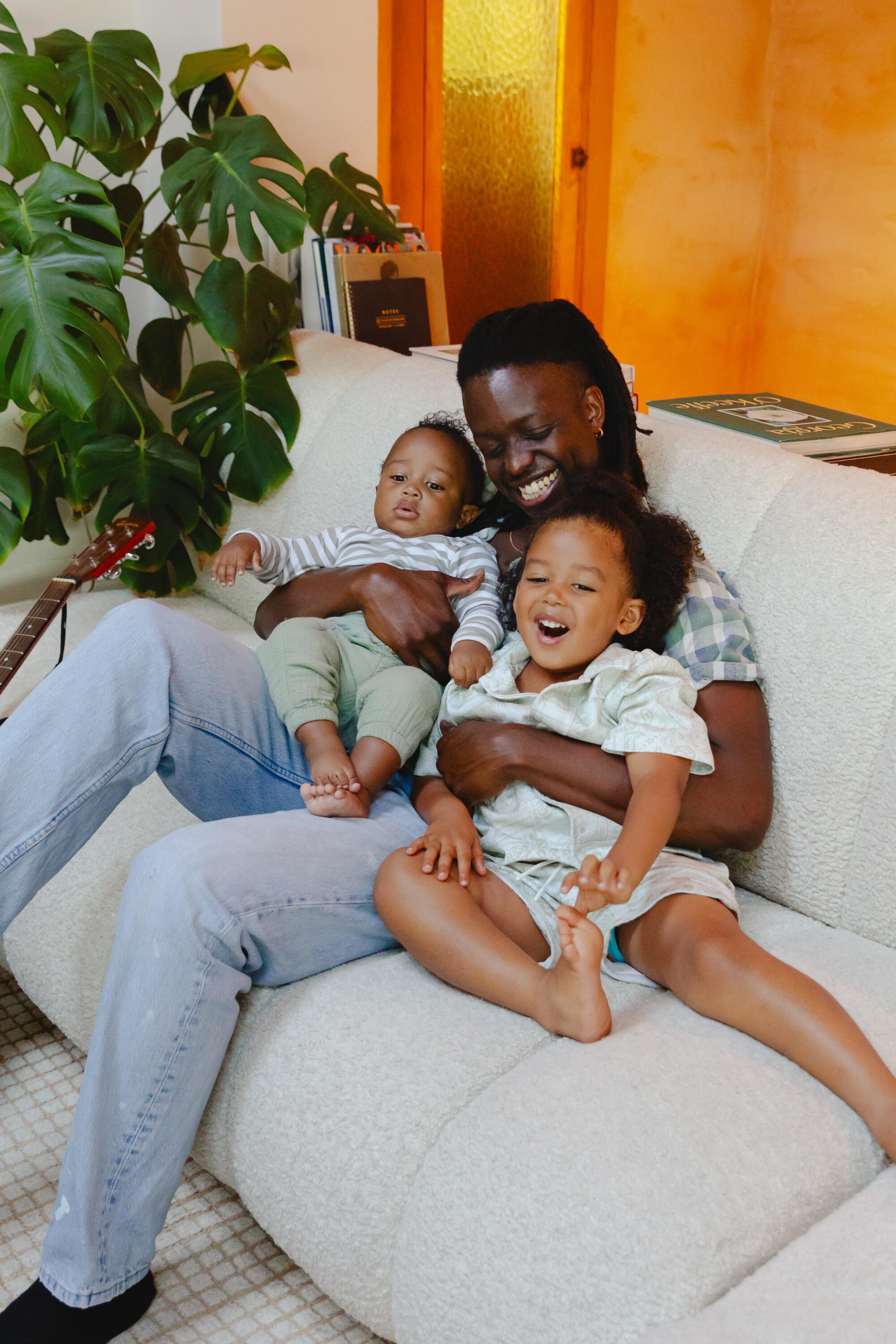Jonathan Singletary is sort of able to go dwell on Instagram. He scans his short-sleeve button-up — it’s clear and completely different from the one he wore final time. He takes a couple of deep breaths. He throws up a fast thank-you to God, opens Instagram, hits the white circle and goes dwell at 5:30 p.m. Individuals from throughout the nation start to tune in for improvised music in a welcoming religious house. It’s time for “Piano & Prayer.”
The late afternoon Los Angeles daylight shines by means of gauzy curtains behind Singletary, who sits at his piano with fingers poised over the keys. The music begins. On Instagram, members of the “Piano & Prayer” neighborhood greet each other and share the place they’re listening from: Atlanta, Pittsburgh, Houston, New York Metropolis, Maine, Rhode Island, New Jersey and even Chile.
Jonathan Singletary connects with new individuals and longtimers throughout his “Piano & Prayer” classes.
(Amanda Villarosa / For The Occasions)
Singletary riffs with the boldness of a musician who started enjoying a toy piano on the age of 5 in his household residence in Nashua, New Hampshire. Now, a 38-year-old father of two, he begins vocalizing as he performs, generally forming phrases, however at all times in a soothing concord.
Through the early days of the pandemic, from his front room in New York, Singletary began “Piano & Prayer,” a weekly religious, however not essentially non secular gathering, for individuals to attach and share. For him, it was the proper antidote to the isolation he was feeling.
“Hello, hello, welcome to ‘Piano & Prayer.’ Happy Monday,” Singletary says. He stops enjoying and turns towards the digital camera with a heat, welcoming smile.
Singletary’s eyes gentle up. “Jaden, good to see you, my mom’s in here, so many familiar faces, Hannah, good to see you, Aunt Jeanette, good to see you. I missed y’all, I missed this.” Singletary and his household had been on trip for a few weeks, and he’s excited to be again. “Debra, good to see you.”
Debra Mazer, a “Piano & Prayer” unique, is watching from Atlanta. “ I had Jonathan’s sessions on my pandemic roster . I had a schedule for myself that I put in the calendar because the Zoom groups were very important to my mental health and well-being,” Mazer says. She found this gathering by following Singletary’s then-financée, now spouse, Elaine Welteroth, former editor in chief of Teen Vogue.
It was a troublesome time to be knowledgeable musician in April 2020. “ I made music. I’ve done a lot of shows, but all of that was shut down,” Singletary says. He credit Welteroth with encouraging him to mix social media with music. He remembers her saying, “ Go on in there and just play, just play some music.”

Jonathan Singletary performed music at New York venues earlier than the pandemic, however as soon as stay-at-home orders have been in place, he wanted one other outlet: Enter “Piano & Prayer.”
(Amanda Villarosa / For The Occasions)
Singletary confesses it was a bumpy begin. The primary iteration was him enjoying acoustic variations of his songs: “I t didn’t fully resonate with me.” So he returned to his first instrument, the piano. “Piano & Prayer” wasn’t set as much as be a moneymaking endeavor at first, however Singletary not too long ago launched a Patreon, which permits creators to gather cash straight from followers.
“ I was always playing piano for fun. I would go into the chapel at my Catholic high school, and I would play piano, and my friends would come in and lie on the floor and just zen out while I played,” he remembers. “This thing [“Piano & Prayer”] has existed for some time.”
Quick ahead to 2020, as an alternative of a chapel ground, remoted individuals from throughout the nation carved out 45 minutes to attach. Mazer notes that whereas the world has moved on from COVID, “Piano & Prayer” is without doubt one of the on-line actions she began throughout the pandemic that she nonetheless attends frequently.

Jonathan Singletary riffs whereas enjoying throughout his Instagram classes, generally simply vocalizing as viewers share their prayers within the feedback.
(Amanda Villarosa / For The Occasions)
The Monday night classes are a mix of light piano music, meditation, prayer and neighborhood. Throughout a current livestream, 40 individuals gathered — those that wish to share what they’re considering and feeling within the chat, providing prayers for themselves and others.
“For those affected by the flooding in TX,” one individual shares.
“Praying for my students that they make up their work this summer session and pass to graduate,” somebody varieties.
“Praying for the families in Texas. Lord, have mercy,” pops up.

Jonathan Singletary performs the piano in a nook of his residence.
(Amanda Villarosa / For The Occasions)
Singletary adopts a pleasant method, assembly individuals the place they’re with their religiosity or spirituality. By no means preachy or too churchy — generally God isn’t talked about. He was raised in a churchgoing household. “The church was a huge part. Has been a huge part of my life for as long as I can remember.”
For Singletary, the thought of going to church each Sunday modified throughout the pandemic. He didn’t really feel protected, after which he moved to a brand new metropolis and discovering a brand new church was onerous with social distancing.
On the opposite aspect of the nation, it’s 8:30 p.m. and Bobby Brown’s 4 youngsters, ages 5 to 12, are in mattress. “Piano & Prayer” performs on his cellphone whereas Brown and his spouse are hanging out within the humid evening air. “ It’s just like a romantic thing in the background while we’re talking,” Brown explains.
“Then he [Singletary] throws out some prayers. We pause and take some deep breaths, because he tells us to and he reminds us to.”

Jonathan Singletary, along with his youngsters.
(Amanda Villarosa / For The Occasions)
Earlier than relocating to Atlanta, Brown lived in Inglewood. He runs a nonprofit group referred to as Donuts For Dads, a supportive neighborhood for fathers. That is the place he and Singletary first linked. Brown says he didn’t understand his buddy had this rising on-line neighborhood.
“ He doesn’t even promote it. It was just like, ‘Hey, I’m going live, ’” Brown laughs. “Whenever I see any of my friends go live, I just click to support them. Even if I can only hop on for a couple of minutes, try to throw some hearts in there.”
Each Mazer and Brown might be thought of half of a bigger pattern of people who establish as religious reasonably than non secular. A 2023 Pew Analysis Heart survey discovered that 41% of U.S. adults report having grown extra religious all through their lifetime, in contrast with solely 13% who say they’ve turn out to be much less religious.
This knowledge is sensible to Sarah Wilkins-Laflamme, an affiliate professor in social research and authorized research on the College of Waterloo in Ontario, Canada, the place her space of experience is the sociology of faith.
“ It’s like, no, religion’s not for me. But I like spirituality. All these shifts have happened across generations, especially amongst younger cohorts, the term religion itself now has almost a negative connotation in some contexts, but spirituality doesn’t.”
Singletary, who has about 25,000 followers, publishes the Instagram Lives on his grid and says the views on every “Piano & Prayer” session are often round 1,000, however have reached as excessive as 5,000.
“This isn’t about people watching me do a thing. The most touching to me and maybe validating as well, is that I see people engaging with each other and encouraging each other and praying for one another and responding to each other’s prayer requests.”
For the second, if it’s a Monday at 5:30 p.m., you will discover Singletary at his black lacquered piano able to welcome anybody who wants it into the “Piano & Prayer” household.


